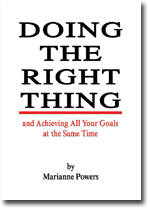Chapter 5
What we say and do are choices that we make. Although we sometimes say we “have to” say or do something, that’s not really true. We choose to say or do something and also to whom, what, where, when, and how. When we make that choice, we are accountable to other people for our words and actions, not because we have to get their permission, but because they will react to us.
If we want to do the right thing and achieve all our goals, we need to really think about the choices that we make, what we say and do. What we say and do affects other people. With our words and actions, we can help or hurt, inspire or discourage, anger or bring happiness, and everything in between. We need to choose our words and actions with care for their effect. We also need to pay attention to what other people say and do and make choices based on those things.
At the beginning of a relationship, a job, a project, we need to explain what we are trying to do and why. We need to explain again when we say or do things that seem contrary to our stated goals. Hopefully, people will point out our inconsistency if we say one thing and do another, and question us if we say, for instance, that we believe in them as a group but we belittle some of the individuals in it. People help us by holding us accountable when we get tired or forget or don’t realize that we’re not doing what we said. Based on what we say and do, people make choices about helping or fighting us, being with us or leaving us.
Other people are also accountable to us and to everyone else for what they say and do. We have the right and the responsibility to question them, tell them when we think they are wrong, and support them when we think they are right. The thought, “What did they mean by that?” should almost always be followed by the question, “What do you mean?” When people say they are going to do something, they invite questions about how they are going to get it done. When people say they are not going to do something, they invite questions about why. When people praise us, they owe us the specifics of what they thought was good. When people insult us, they owe us the specifics of what they thought was bad. When people do things, they should expect us to check on them to make sure what they are doing is consistent with their stated goals. If they are not, they should expect us to say so. When people do odd things, they definitely owe us an explanation. We can’t make anyone do these things, of course, but we can ask and make choices based on the answer or even based on no answer.
Sometimes, what people say and do is unacceptable because it hurts someone else. It is our right and responsibility to say so and set ourselves apart from that person if they persist. Sometimes, what people say and do is unacceptable to people in general -- otherwise known as illegal – and they are set apart in a formal way. If we do not speak up or do anything when we see someone else say or do something that hurts someone, we are accomplices to it.
Even when we are responding to someone else, we need to make sure that our words and actions help us achieve our goals. We are still responsible for what we say and do even when “provoked”.
I used to think that other people made me angry. Now I know that I make myself angry because I hear someone’s words or see their actions, interpret them as hostile to me, and leap to my own defense, usually with an attack of my own. I used to say, “I couldn’t help it, she made me mad!” Now I know that I have a choice. I really haven’t changed, I am still who I was, and I still have the same internal reaction to the same stimulus, but now I know I can chose what I say and what I do in response to it. Now I know that no good will come of it if I speak while I am still angry. Now I know that I have to take the time, maybe just a moment, to figure out where I want this to go and how to get it there.
Usually, if I don’t strike back right away and just listen instead, people will explain themselves. Many times, it will turn out that the insult I perceived was not intended (or maybe they heard how they sounded, too, and decided to change it). If not, I can get them to explain by telling them what I heard and maybe how it made me feel.
Alternatively, I might decide it’s not really about me (most of the time it’s not about me, I find when I look at it calmly). If I just keep repeating that to myself, I can usually keep myself from responding in anger. Then I don’t need an explanation, I can just ask for what I want instead of fighting.
Either way is better than responding in anger. Even if they were trying to make me mad, that doesn’t mean that my responding in kind is right or helps me achieve my goals. I still need to choose what I say and what I do. And, even if I choose to fight, that needs to be my conscious choice, not my knee-jerk reaction!
We are all accountable to each other for our words and actions.



0 Comments:
Post a Comment
<< Home